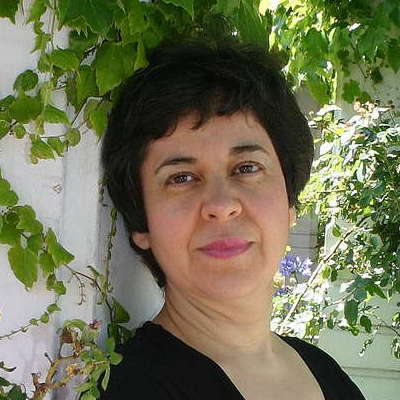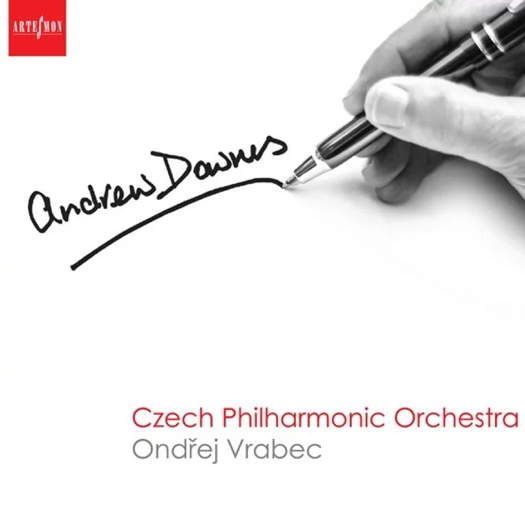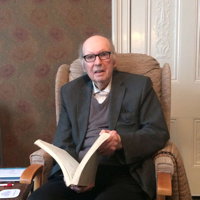 SPONSORED: Profile. A Gold Mine - Roderic Dunnett visits Birmingham to talk to John Joubert.
SPONSORED: Profile. A Gold Mine - Roderic Dunnett visits Birmingham to talk to John Joubert.
All sponsored features >>
Out of Nature
GIUSEPPE PENNISI was at the opening concert
of the 2019 Chigiana International Festival
The Chigiana International Festival and Summer Academy is one the longest and most interesting music festivals in Italy and most likely in Europe. This year it runs from 6 July to 31 August and it includes some sixty concerts; several are free. It has a title and a unifying theme: Out of Nature, meaning both the nature of sound and the sound of nature. It includes debuts of new compositions, Italian premieres and great repertory music.
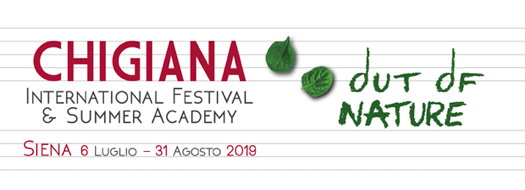
The festival is now at its fifth edition. It is the brainchild of the Italian composer and music organizer Nicola Sani - read 'Highlights of a Composer', 9 February 2019 - who has also been, amongst other things, music director of Teatro dell'Opera di Roma and superintendent of Teatro Comunale di Bologna. As reported previously in Music & Vision, the festival is based on two different earlier experiences: the Chigiana Academy of Music, which started in 1938, and the Chigiana Week, which started after World War II. Both were initiatives by a private sponsor, Count Chigi-Saracini, who had previously organized a contemporary music festival in 1928 with world premieres of works by Prokofiev, Walton, Casella, Ravel, Webern, Hindemith and De Falla. Among his collaborators, Count Chigi-Saracini had important composers such as Ottorino Respighi.
Academy of Music masterclass participants are selected via a worldwide competition, and have the best international musicians as their instructors such as, this year, among others, conductor Daniele Gatti, pianist Lilya Zilberstein, composers Salvatore Sciarrino and Kassel Jaeger, cellist Ernst Reijseger and tenor William Matteuzzi. The participants come from fifty-two different countries. Necessarily, the masterclasses focus on the classics. The Academy concerts take place in the magnificent Palazzo Chigi-Saracini, as well as in two charming theatres and other venues - churches and squares.
Sani's brilliant as well as simple idea has been to merge the Academy courses and concerts with the Chigiana Week into a single festival of international standard. The Siena Music Academy has always been a gateway to fame.
This summer, Out of Nature is an extraordinary laboratory of productions ranging from the Baroque period to contemporary music. The concerts feature great performers with exclusive events by David Krakauer, Manu Delagu, Mari Kamura, Gene Coleman and Bruno Lefort. There are eight resident ensembles. Several concerts are broadcast live on the Italian national radio channels and, in addition, from 6 July until 31 August 2019, a web radio channel, Chigianarte, is broadcasting the most interesting contemporary works with a special focus on the soundscape as interpreted by today's composers. A section of the festival is devoted to Iannis Xenakis, a composer especially attentive to both the nature of sound and the sound of nature; twenty of his masterpieces will be performed. A fully staged opera is also included in the festival: Il barbiere di Siviglia by Giovanni Paisiello - a real exploration of the nature of human beings.
I was in Siena for the 6 July 2019 inaugural concert - the long-awaited return to Siena, after sixteen years, of the Orchestra of the Maggio Musicale Fiorentino, conducted by Fabio Luisi with, as soloist, the world famous Russian pianist Lilya Zilberstein, one of the pillars of the Chigiana Academy masterclasses.
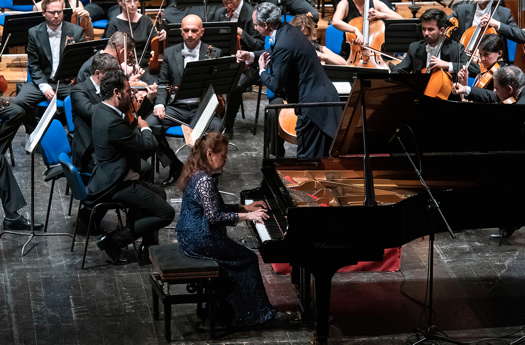
Lilya Zilberstein playing Tchaikovsky with Fabio Luisi and the Orchestra of the Maggio Musicale Fiorentino at the Chigiana International Festival. Photo © 2019 Roberto Testi
The concert included Tchaikovsky's Concerto No 1 for Piano and Orchestra in B flat minor and Ludwig van Beethoven's Symphony No 6 in F major, Pastoral. They both deal with the sound of nature and with the nature of sound.
Tchaikovsky composed this piano concerto over a long period and revised it several times. Older readers may remember that it formed part of the soundtrack to Ken Russell's movie on Tchaikovsky's life, The Music Lovers; it counterpointed the sequences where the composer was searching, in the landscape, relief from his inner and most intimate torments about his own sexual orientation. Fabio Luisi, Lilya Zilberstein and the orchestra rendered this torment and the search for relief quite well, especially in the third and final movement - a dramatic and extended climatic episode, starting mysteriously and gradually building up to a triumphant dominant prolongation. Then the second theme is heard triumphantly in B flat major. After that, the final part of the coda, marked allegro vivo, is a perfect cadence on the landscape providing relief.
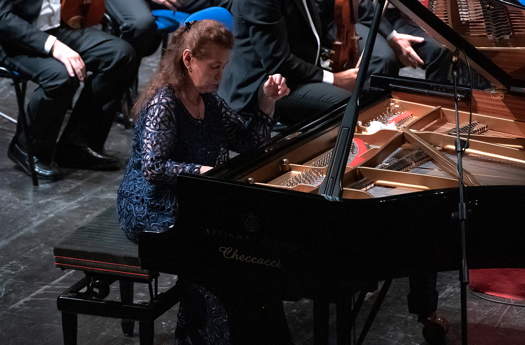
Lilya Zilberstein playing Tchaikovsky at the Chigiana International Festival. Photo © 2019 Roberto Testi
Beethoven was a lover of nature who spent a great deal of his time walking in the countryside. He frequently left Vienna to work in rural locations. The composer said that the Sixth Symphony is 'more the expression of feeling than painting'. This point was underlined by the masterful performance of the Maggio Musicale Fiorentino Orchestra. Whereas in several renderings, also including well-known recordings, emphasis is on the descriptive, almost pictorial, elements, in this performance the focus was on the feeling for nature and for its sound.
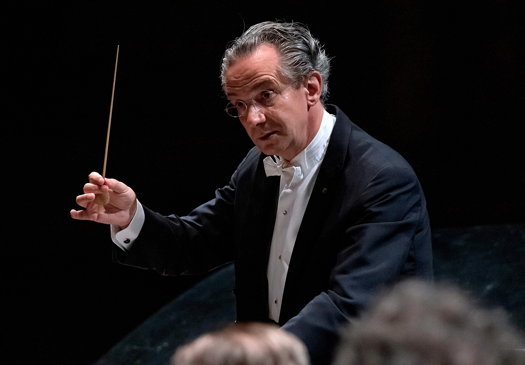
Fabio Luisi conducting at the Chigiana International Festival. Photo © 2019 Roberto Testi
The Teatro dei Rinnovati was full and the audience applauded very warmly.
Copyright © 12 July 2019
Giuseppe Pennisi,
Rome, Italy



